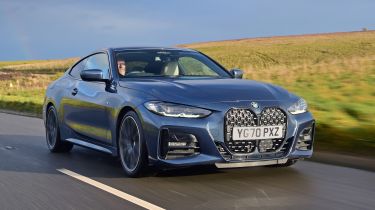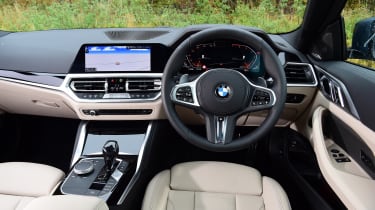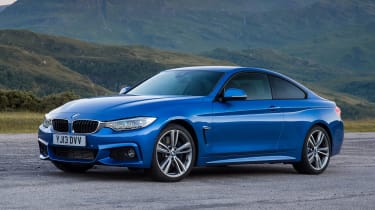BMW 4 Series review
The impressive 4 Series Coupe pushes the envelope for driving dynamics and style

The new BMW 4 Series continues where the previous model left off - offering a stylish, fun-to-drive coupe that is brilliantly accomplished in so many key areas. Facing a number of talented rivals, the 4 Series manages to seamlessly combine impressive performance, attractive economy and a driver-focused quality that is hard to beat.
There has been a lot said about the front-end styling, and you’ll need to make a decision on whether this design trait works for you or not, but rest assured that BMW knows a thing or two about creating capable driving machines and the latest 4 Series doesn’t disappoint.
About the BMW 4 Series
BMW is reassuringly predictable, as a rule, turning out handsome new models from different sizes of a basic mould, leaving us free to fawn over the marque’s generally impeccable driving characteristics, and the quality and depth of its engineering. We all get accustomed to the rhythm of their gently evolving designs, and it makes us feel warm and safe.
Then BOOM! The canny German manufacturer goes and pulls the rug out from under us, with a mad new look that’s appeared out of nowhere. But of course it’s happened before, so we shouldn’t really be too surprised. And despite all the heat and noise generated by the wildly gaping maw of the new 4 Series coupe, before you know it, that’ll just be what BMWs look like now. And everything will be safe and predictable again, until the next time...
Used - available now

2020 BMW
4 Series
52,756 milesAutomaticDiesel2.0L
Cash £16,709
2014 BMW
4 Series
67,597 milesAutomaticPetrol2.0L
Cash £12,500
2020 BMW
4 Series
57,788 milesManualPetrol2.0L
Cash £12,950
2023 BMW
4 Series
20,485 milesAutomaticDiesel2.0L
Cash £27,349Some manufacturers produce cars almost as general appliances, designed to get from A-to-B with not much focus on dynamic ability, design flair or driving fun. BMW generally does the opposite of this, and the 4 Series is a good example.
Such a big change to the famous BMW kidney grille was always going to invoke the ire of traditionalists, but it was the same when BMW’s head of design, Chris Bangle, delivered the radical lines and curves of the E60 5 Series almost 20 years ago. Style is subjective, as they say, so it's probably best to agree that some will be drawn to the updated looks of the 4 Series, while others will no doubt seek solace elsewhere.
There are skilled rivals waiting in the wings in the form of the Audi A5 and Mercedes C-Class coupes, both of which offer a convertible version alongside the standard model ready to do battle with the 4 Series’ own drop-top.
For those that need a little more practicality, there is also the extra two doors, bigger boot and increased passenger space of the 4 Series Gran Coupe to consider, although Audi provides further competition here with the A5 Sportback.
More left-field coupe choices include the Lexus RC and Ford Mustang, although neither provide as complete a package as any of the German trio.
At opposite ends of the spectrum, the all-electric BMW i4 has received much praise since its launch in 2021, while the fire-breathing 503bhp M4 Competition is ready to take your breath away with its incredible performance.
The 254bhp 430i petrol and 187bhp 420d diesel models are no longer available on the price list, leaving just the 181bhp 420i 2.0-litre petrol at the heart of the range.
If you're after an M-badged model, there's the potent 3.0-litre inline six-cylinder powerplant of the M440i which generates 369bhp, while the M4 Competition is on another level in terms of performance with 503bhp. All cars use an eight-speed automatic transmission and are offered as either rear-wheel or all-wheel drive models, with the exception of the M440i which comes solely with BMW's xDrive system.
The Sport trim level has also been discontinued, with only the ubiquitous M Sport specification now provided for the 4 Series. There is an option to upgrade to the M Sport Pro Edition which adds bigger alloy wheels and various driver-focused features such as adaptive M suspension and an M Sport differential.
With a starting price of more than £42,000, the 4 Series Coupe sits between its Audi and Mercedes rivals, although we’d say that the BMW is the best all-rounder.
Engines, performance and drive
Rest easy, BMW hasn’t contrived to ruin any of the 4 Series’ driving talents. It still delivers in spades on that great ability to turn from a comfortable cruiser into a fun B road blaster.
Strong engines and the superb eight-speed automatic transmission make for a spirited combination. The Comfort drive mode is fine for tootling around, but engaging Sport mode helps to wring the full performance from the engine with quicker shifting and sharper steering feel. One thing we found during our test, however, is that leaving the car in Sport at slower speeds does make gear changes feel a little jerky, so it’s perhaps best to toggle between the two depending on the nature of your journey.
The 4 Series comes with M Sport suspension as standard, while the Pro Edition cars feature adaptive M suspension that regulates the damping rate according to which driving mode you’ve selected. Our test car, running on 18-inch wheels and the trick dampers, rode serenely across the worst of UK tarmac, so if you’re focused on comfort it’s probably best to give the optional bigger wheels a miss.
Nit-picking it may be, but steering feel isn’t flawless and the driving purist probably won’t enjoy the overly-thick, doughy steering wheel that prevents the driver from feeling properly connected to the road.
0-62mph acceleration and top speed
Performance across the 4 Series range is strong, with the 181bhp 420i petrol version delivering a 0-62mph time of 7.5 seconds. The 430i (no longer available on the price list) sees a power increase to 254bhp and an improved sprint to 62mph in just 5.8 seconds. The top-of-the-range 440i is a serious player with 369bhp and enough pace to complete the same benchmark in 4.5 seconds - just 0.6 seconds behind the M4 Competition (which will cost you almost £25,000 more to buy).
Diesel power has now been discontinued, although if you track down a used 420d model you'll find it delivers plenty of low-down grunt - able to reach 62mph from a standstill in 7.1 seconds, with the xDrive variants a little behind at 7.4 seconds. The equivalent convertible models are all around 0.5 seconds slower due to carrying around an extra 160kg in weight.
MPG, CO2 and running costs
In terms of overall affordability the BMW 4 Series is a pretty well-rounded proposition. Although there is no plug-in hybrid version and diesel power is now off the price list, the 420i petrol is reasonably economical, while the i4 model provides an efficient all-electric option.
BMW claims the entry 420i petrol variant will achieve up to 44.1mpg on the combined cycle, with CO2 emissions from 145g/km, so company car users will be paying a 34 per cent Benefit-in-Kind tax rate for the 2023/24 financial year.
Opting for the top-spec M440i xDrive still brings decent enough economy with an average of 36.7mpg, while the (now discontinued) 430i petrol returns up to 42.2mpg and 153g/km of CO2.
Tracking down a used example of the 420d oil burner may suit some buyers as it returns an incredible 61.4mpg on the WLTP combined cycle, with CO2 emissions of 121g/km.
As with the performance figures for the 4 Series, choosing a convertible model also brings a slight penalty to overall efficiency - for example, fuel economy for the 420i drop-top is down by 2.6mpg with CO2 emissions rising 8g/km on average, depending on your chosen trim.
Insurance
The 4 Series Coupe starts from insurance group 30 for the entry-level 420i, rising to group 40 for the 369bhp M440i xDrive performance version. This compares favourably with the Mercedes C-Class Coupe range, which kicks-off in group 35 and rises to the top group 50 for the hot C63 S model.
Depreciation
When pitched against its closest rivals, the latest BMW 4 Series performs well in terms of residual values. Over a typical three-year/36,000-mile ownership period, our expert data suggests that the model should hold onto around 55 per cent of its original list price, which is better than the Audi A5 Coupe at 50 per cent and the Mercedes C-Class Coupe at 44 per cent.
Interior, design and technology
It’s probably more than fair to say that the second-generation BMW 4 Series has received a mixed response to its front-end makeover. The larger grille dominates the front of the car, but perhaps provides the style statement that buyers of cool coupes and convertibles are looking for.
Although sharing the same underpinnings as its 3 Series sibling, BMW has designed the 4 Series with a focus on form following function: the wider rear track helps increase grip, but also gives a more aggressive stance, while the coupe sits lower than the saloon which reduces its centre of gravity and adds to the impression that the 4 Series is the more sporty, driver-orientated car.
Inside, the cabin doesn’t deviate from the quality 3 Series formula, with a similar dash layout and the usual feeling that you’re sitting in a car that is thoroughly well-engineered. Buyers of the first-generation 4 Series mostly specified their cars with the popular M Sport trim, so BMW has decided to go solely with this equipment level throughout the range.
Standard kit is generous with 18-inch M alloy wheels, LED headlights, cruise control, Vernasca leather upholstery and BMW’s Live Cockpit Professional set-up featuring a 10.25-inch infotainment touchscreen and a 12.3-inch digital instrument display. The Pro Edition upgrade adds 19-inch wheels, unique paint colours, adaptive dampers and further M branded trim.
Sat-nav, stereo and infotainment
BMW’s infotainment systems have long been among the best in the business, with only a lack of Android Auto as a criticism. That has now been addressed, while Apple CarPlay works as smoothly as ever.
Beyond smartphone connectivity, the BMW system’s strengths remain; the graphics look clear and sharp, the user interface is well laid out and loading times are quick. Aside from slightly contrived gesture controls, the input methods are great; the touchscreen is brilliant for entering addresses and postcodes when the car is stationary, while a click wheel surrounded by physical shortcut buttons on the centre console means it’s easy to make small adjustments.
Even the voice assistant works effectively, but if we’re being picky, the 12.3-inch digital instrument panel looks a little cluttered compared with the tidy main screen.
Practicality, comfort and boot space
If you’re buying a two-door coupe or convertible, then practicality probably isn’t going to be high on your agenda. The beauty of the 4 Series, however, is that while it’s capable of providing plenty of driving fun, it’s also an adept, comfortable cruiser.
The 18-inch wheels of the M Sport trim offer the best ride, so it might be best to avoid the larger 19-inch alloys if your priority is just to enjoy coasting around. BMW does like to tempt you with expensive options, and the Comfort Pack is available for around an extra £1,000 - including items such as an automatic tailgate opening function, a heated steering wheel and BMW’s Comfort Access system. You can upgrade to the Plus Pack version which adds electrical adjustment for the front seats.
Dimensions and size
The 4 Series is longer and wider than its 3 Series counterpart, measuring 4,768mm and 1,852mm respectively, although it sits a full 52mm lower at 1,383mm. The Mercedes C Class Coupe is 72mm shorter than the 4 Series, 42mm narrower and 25mm taller, so just in terms of basic dimensions it doesn’t appear to be a match for the hunkered down appeal of the BMW.
Leg room, head room & passenger space
The driver and front passenger will find plenty of space to make themselves comfortable. In the back, things are a little different with two well-bolstered seats that, while fine for younger occupants, probably aren’t the best for adults on longer journeys. In fact, we found that rear foot space is also at a premium, particularly if the front seats are set to a low position.
Boot space
With boot space totalling 440 litres the 4 Series offers decent practicality and actually trumps the Mercedes Coupe by a good 40 litres, although it can’t quite match the Audi A5’s 450 litres of luggage space. The centre section of the rear seats in the 4 Series usefully folds flat, so it is possible to create further room for longer items.
Reliability and safety
BMW has a great reputation for safety and, while the 4 Series is yet to be crash-tested by Euro NCAP, we’d expect it to receive a top rating. It’s based on the same CLAR platform as the 3 Series which gained a full, five-star score in 2019, with a reassuring 97 per cent result for adult protection and 87 per cent for child occupant safety.
Standard kit includes cruise control, front and rear parking sensors and BMW’s Active Guard Plus system which adds a lane-departure warning, automatic emergency braking and speed limit information.
The Driving Assistant Professional systems come as part of the (£3,650) optional Technology Plus Pack and includes Active Cruise Control, a crossing traffic warning, a Lane Keeping Assistant with active side collision protection and a wrong-way warning.
BMW’s performance in our annual Driver Power customer satisfaction survey hasn’t been the best of late, although it has shown signs of steady improvement. In 2020, the manufacturer placed 27th out of 30 brands, followed by a 21st-place finish a year later. In 2022's poll BMW was voted into 16th spot - well ahead of Mercedes in 23rd.
Warranty
The 4 Series is covered by BMW’s standard three-year, unlimited-mileage warranty, which matches that of Mercedes and betters Audi’s 60,000-mile limit over the same period.
Servicing
BMW offers its Pay Monthly Service Plan which allows you to spread the cost of scheduled maintenance. A 36-month agreement costs around £25 per month.
Used and nearly new
BMW 4 Series history
The BMW 4 Series arrived as a replacement for the old 3 Series Coupe, presenting itself as a more upmarket model with even better driving dynamics. To confuse matters, the four-door Gran Coupe also joined the range to add a touch more practicality. The 4 Series Convertible completes the range.
BMW 4 Series Mk2: 2020-
The current BMW 4 Series takes everything that was great about the original car, then improves it in just about every department. Some people are unable to look beyond the flamboyant styling, but those that do will find a car that pushes the envelope in terms of driving dynamics and quality. This is a quality coupe that’s great to drive and, yes, good to look at.
BMW 4 Series Mk1: 2014-2020
It seemed a bit odd when BMW axed the two-door 3 Series Coupe and launched the 4 Series as its new two-door coupe model. Not that it took us long to get used to it, because we were soon won over by its blend of quality, style and driving dynamics. Coupe, Convertible and Gran Coupe versions formed part of a terrific range of cars. Read our full Mk1 BMW 4 Series buyer’s guide here…



